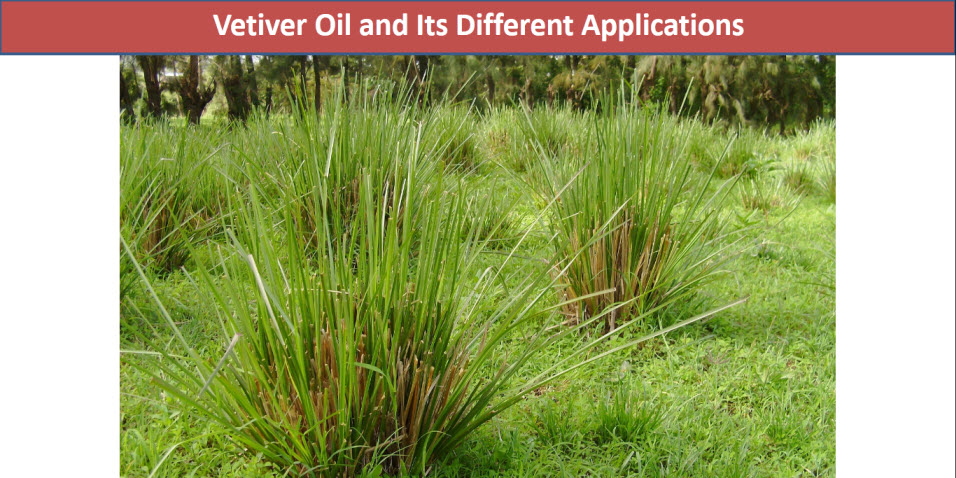Blogs

Vetiver Oil and Its Different Applications
There are a number of reasons why a person may be interested on vetiver oil. This can be because of the ayurvedic and medical value of the product, the ability of it to repel pests and even its economic worth. In this article, we will discuss some of these benefits, and also some of the applications as well.
Why Use Vetiver Oil as Ayurvedic Medicine?
Vetiver has been an important ingredient in Ayurvedic medicine for thousands of years. The essential oil is known for its calming properties. It is also a natural antioxidant.
Vetiver is a perennial grass with brownish-purple roots and flowers. It belongs to the Poaceae family.
There are a number of different species of vetiver. Some are dextrorotatory and some are anti-fungal. In India, it is commonly known as Khus.
Vetiver is used for rheumatism and inflammatory disorders. It is a great tonic, stimulating the circulatory system and easing muscular pains. You can add it to your bath water for relief from joint pains. Vetiver oil is usually distilled from the leaves and roots of the vetiver plant.
Free Radical Scavenging Activity of Vetiver Oil
If you are searching for an antioxidant with free radical scavenging activity, you may want to consider using vetiver oil. Vetiver oil contains many antioxidant compounds which contribute to its effectiveness. These antioxidant compounds may help protect the skin against damaging free radicals.
A large number of free radicals can cause acute or chronic damage to the skin. Free radicals can lead to lipid peroxidation in the membrane lipids, a condition called lipid peroxidation. This can result in skin cancer and immune imbalance.
The anti-oxidative ability of a plant is often evaluated by comparing the amount of free radicals it scavenges. One method is the DPPH scavenging assay. In this assay, a solution of a plant extract and a standard is mixed and then allowed to stand in dark for 12 to 16 hours. After that, the molar extinction coefficient of the solution is measured.
What are The Properties of Vetiver Oil?
Vetiver oil is used in the food industry for flavouring and has antioxidant properties. It is also beneficial for aromatherapy. This study is conducted to evaluate the antifungal and antibacterial properties of vetiver essential oil.
The antimicrobial activity of the oil was evaluated using an in vitro method. Eight essential oils were tested against a 48-hour-old biofilm on stainless steel. Results showed a significant decrease in viable biofilm cells.
A GC-MS analysis of the oil revealed that the oil contained 48 components. These were categorized into four groups: hydrocarbon alcohols, carbonyl compounds, carboxylic acids, and monoterpenes.
In addition to the antioxidant properties of the oil, it showed the ability to chelate toxic metals. The chelation occurs by the action of glutathione S-transferase and peroxidase dismutase.
Vetiver Oil as Pest Repellent
Vetiver oil is a natural and potent insect repellent. The essential oil has been used for thousands of years in traditional medicine. However, detailed knowledge of the components' repelling effects on insects is still scarce.
In order to identify the constituents in vetiver oil, gas chromatography/mass spectrometry was used. It was found that the oil contains a- and b-vetivones, terpinen-4-ol, isolongifolene, and p-menthane-3,8-diol.
Vetiverol, a terpinen-4-ol component of vetiver oil, showed significant contact irritancy response at all concentrations. This constituent is a potential antimicrobial and could synergize with rosemary and other oils.
Neem oil (Azadirachta indica) and cinnamon oil (Cinnamomum zeylanicum) were effective at repelling larvae, but less effective at repelling adult house flies. These oils were tested as stand-alone oils and in blends with sunflower oil.
Final Thoughts
Vetiver Oil is one of the essential oils with strong medicinal and cosmetic properties. It has been used for several centuries for its healing properties and fragrance.
The vetiver plant is a native of India and has been cultivated for its roots and essential oil for many centuries. Today, it is primarily cultivated to produce its essential oil.
Vetiver has a robust vertical root system that stabilizes soils. It has been widely cultivated in the western coastal districts of south India for soil conservation.
Vetiver is also a phytoremediation agent for metal-contaminated soils. Several countries, such as DR Congo, Indonesia, Madagascar, and Zambia, use vetiver to stabilize and protect infrastructure.
Vetiver is used in a variety of industries, including the perfume industry. In addition, vetiver oil is a popular ingredient in food additives and flavouring agents.

